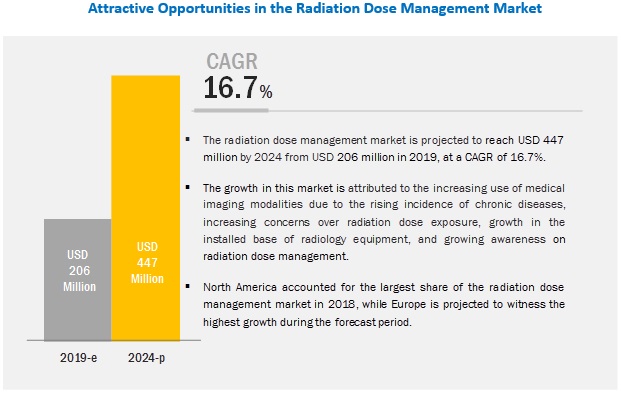According to the new market research report ” Radiation Dose Management Market by Products & Services (Standalone, Integrated Solutions, Education & Training Services), Modality (Computed Tomography, Nuclear Medicine), and End User (Hospitals, Ambulatory Care Settings) – Global Forecast to 2024″, , published by MarketsandMarkets™, The radiation dose management market is projected to reach USD 447 million by 2024 from USD 206 million in 2019, at a CAGR of 16.7% during the forecast period.
Access Free Sample Research Copy :https://www.marketsandmarkets.com/requestsampleNew.asp?id=82326344

The radiation dose management solutions segment is expected to grow at the highest CAGR during the forecast period :
Based on product & service, the market is segmented into radiation dose management solutions and radiation dose management services. The radiation dose management solutions segment is projected to witness the highest growth during the forecast period.
The computed tomography segment accounted for the largest share of the radiation dose management market in 2018 :
By modality, the market is segmented into computed tomography (CT), fluoroscopy and interventional imaging, mammography, and nuclear medicine. The computed tomography segment accounted for the largest market share in 2018.
Hospitals accounted for the largest share of the market in 2018:
Based on end user, the market is segmented into hospitals, ambulatory care settings, and other end users. The hospitals segment accounted for the largest share of the market in 2018.
Download PDF Brochure : https://www.marketsandmarkets.com/pdfdownloadNew.asp?id=82326344
North America accounted for the largest share of the radiation dose management market in 2018 :
On the basis of region, the market is segmented into North America, Europe, Asia Pacific, and the Rest of the World (RoW). In 2018, North America accounted for the largest share of the market. The large share of North America can be attributed to factors such as the stringent legislative and accreditation requirements regarding the reporting and optimization of radiation doses, high adoption of HCIT technologies, and the presence of stringent regulatory requirements regarding patient safety.

